Tree Felling In Historical Sa'dabad Complex Courts Environmental Concerns
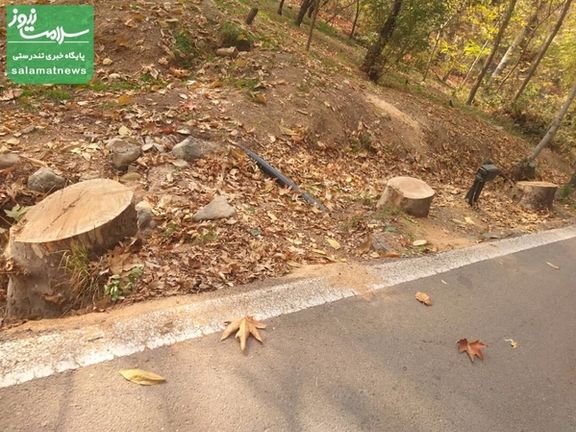
The felling of ancient trees in Tehran's historical Sa'dabad Cultural-Historical Complex, home to the Shah's palace, has sparked controversy from environmental activists.

The felling of ancient trees in Tehran's historical Sa'dabad Cultural-Historical Complex, home to the Shah's palace, has sparked controversy from environmental activists.
The historical complex constructed by the Qajar and Pahlavi monarchs, sprawling over 110 hectares in northern Tehran, encompasses natural forests, canals, gardens and museums, one of the capital's most famed destinations.
Recent public outrage ensued as images circulated depicting the removal of at least four aged trees on Italy Street in Tehran. Despite claims by eyewitnesses that one tree was “alive”, the municipality asserted that two were entirely “dry”, justifying the action as a precautionary measure to “eliminate the danger.”
Several years ago, a similar incident occurred when trees in the Sa'dabad complex were cut to construct a restaurant. Cultural heritage authorities defended the action, citing the trees as “annoying, obstructive, and pest-infested.”
Despite stringent penalties, including imprisonment, outlined in the Islamic Republic's laws for arbitrary tree cutting, little evidence has shown enforcement. Moreover, there is no reported information on whether municipal authorities have undertaken tree planting initiatives to compensate for the loss of aged and dry trees in Sa'dabad or elsewhere.
Urbanization has long posed a threat to Tehran's historical natural landscapes. The ancient trees that line Tehran's longest boulevard, Vali Asr, have over recent years also fallen victim to redevelopment projects - and even merchants who want better visibility for their shops.
Two years ago, the regime also came under fire for selling its Palm trees to countries including Qatar and Kuwait, the uprooting having devastating effects on the local ecosystem.
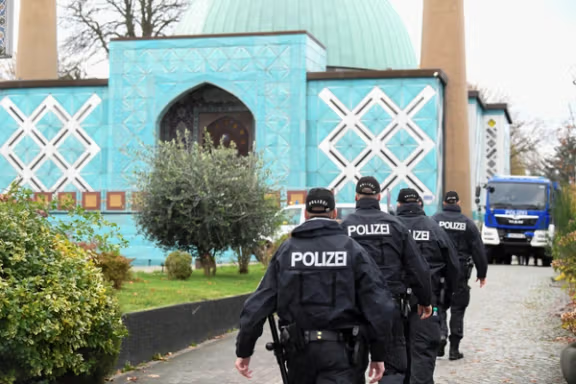
Germany's federal police raided the Islamic Center of Hamburg on suspicions of support for the Lebanese militant group Hezbollah, accused of terrorism.
The interior ministry said the Khamenei-controlled Islamic Center of Hamburg (IZH) activities are “aimed at spreading the revolutionary concept of the Supreme (Iranian) leaders,” and that the center allegedly undermines Germany’s “constitutional order.”
The German interior minister, Nancy Faeser, from the Social Democratic Party said, “We have the Islamist scene in our sights. Especially now, at a time when many Jews feel particularly threatened, we generally do not tolerate Islamist propaganda or antisemitic and anti-Israel incitement.”
The IZH has been a hotbed of pro-Hezbollah activism and support for Qassem Soleimani, the former commander of IRGC's Quds Force. In January 2020, after the US killed Soleimani in a drone strike in Iraq, a group of 600 pro-Iran regime Islamists attended a memorial service at the Hamburg center to mourn his death. The Islamists praised him as a “heroic martyr.”
Germany’ interior ministry outlawed all Hezbollah activities in 2020. In addition to the raid on the IZH in the city-state of Hamburg, the German authorities searched 54 properties across six other German states— Baden-Wuerttemberg,Bavaria, Berlin,Hesse, North-Rhine Westphalia and Lower Saxony. There were no arrests made during the raids. Faeser said with an apparent reference to the troika Hamas, Hezbollah and Iran’s regime (via its proxies) carrying out terror attacks against Israel and US military forces that "Now especially is the time to be on high alert and for a tough approach. This is why we are following every reasonable suspicion seriously."

German-Iranians and dissidents expressed support for the crackdown on the IZH.Dr. Kazem Moussavi , a spokesman for the Green Party of Iran in exile, told Iran International that “The police searches of the IZH and its associated religious institutes are now to be welcomed. But this is inadequate. After banning Hamas and Samidoun, interior minister Faeser should now finally immediately ban the IZH, whose regime is indisputably the decisive mastermind and supporter of the Hamas pogrom against Israel on October 7, 2023.”
In early 2023, the German Federal Administrative Court ruled that the IZH (and its affiliated Blue Mosque are an "extremist Islamic organization."
Moussavi, who has spent years campaigning to bring about the closure of the IZH, added, “The IZH is not a place of prayer for secularist and democratic Muslims but a refuge for jihadist regime supporters, secret service personnel and sympathizers of Hamas and Hezbollah.”
Sheina Vojoudi, a Germany-based associate fellow for the Gold Institute for International Strategy told Iran International that “For years Iranian dissidents try to convince Germany to close the Islamic Centre funded by the Islamic Republic in Hamburg, which according to German courts, is an ‘extremist Islamic organization’.”
She added “All the Islamic centers funded by the Islamic Republic with Iranian wealth must be closed. The Islamic Republic’s intention is to spread antisemitism, observe and threaten Iranians everywhere and build its network all over the world to export its revolution.”
In October 2020, roughly 150 demonstrators urged the city of Hamburg to close the IZH.
According to Vojoudi, " it’s an absolute fact that Hamas is funded and trained by the Islamic Republic and the October 7th terrorist attack on Israel is a warning message to the West considering that Iran’s regime also built its Islamic centers in the heart of Europe. The western city partnerships with the Islamic Republic in Iran legitimize its terror actions and it’s time to reconsider the continuation of the German city partnerships like Freiburg-Esfahan partnership before it’s too late.”
Iranian dissidents have urged Martin Horn, the mayor of Freiburg in southwestern state of Baden-Wuerttemberg, to end its twin city partnership with the Iranian regime in Esfahan. Horn has been vehemently opposed to pulling the plug on the partnership. Iran International sent press queries to Horn after reporting in August that Iranians urged the city of Frankfurt to close a center affiliated with the Islamic Republic.
The capital of Stuttgart in Baden-Wuerttemberg continues to post information about a reportedly pro-Hamas group on its municipal website. Iran International press queries to mayor Frank Nopper of Stuttgart were not immediately returned.
Nopper has refused to delete the notice. Rabbi Abraham Cooper, the associate dean of the Simon Wiesenthal Center, told Iran International "What more needs to be said that one month after the most barbaric mass murder, rape kidnapping and hostage taking of Jews since the Holocaust, Mayor Nopper and his associates allow pro-Hamas postings on the city’s website while 30 Jewish children are held as hostages, It is despicable antisemitism and proves some in Germany have not and will never learn the basic lessons and historic responsibilities from the Nazi Holocaust for Germans."
Iran International sent press queries to Oliver Vrankovic, the chairman of the German-Israel Friendship Association in Stuttgart, whose organization claims to be against Iran’s regime and its proxies, Hamas and Hezbollah. Vrankovic and his foreign ministry funded NGO have refused to publicly urge Nopper to expunge the pro-Hamas information on the taxpayer funded municipal website.
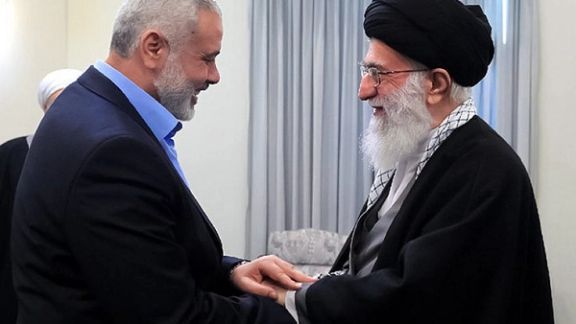
Hamas' has called a Reuters report on the details of a meeting between its leader Ismail Haniyeh and Iran's ruler Ali Khamenei "pure slander and a lie”, according to the Iranian state news agency IRNA.
Reuters reported on Wednesday that the Iranian regime was unaware of Hamas' October 7 terror attack against Israel. The report quoted three anonymous senior officials as stating that in a recent meeting in Tehran, Khamenei told Haniyeh: “You gave us no warning of your Oct. 7 attack on Israel and we will not enter the war on your behalf.”
In an interview with IRNA, published on Thursday, Osama Hamdan, a member of Hamas' political office, denied the claim saying: “Such news is intended to destroy the image of Hamas and the Axis of Resistance in the region.”
The so-called Axis of Resistance refers to a coalition of military forces in the region backed by Iran, including militias in Iraq, Syria, Yemen and Lebanon. For years, Tehran has provided Hamas with military, technical, and operational support.
The Iranian government has not officially commented on the Reuters report, but publication of the interview with Hamdan on IRNA can be interpreted as an indirect response.
The Hamas official added: “Ayatollah Khamenei's meeting with Haniyeh was consistent with Iranian and Hamas' ongoing constructive ties”.
Reuters has updated its report since publication and said Hamas has denied the validity of the report on Telegram, calling it "baseless”.
At least 1,200 people, mostly civilians, were killed and 240 more were taken hostage by Hamas after its surprise attack on Israel on October 7. This has led to the most deadly conflict between the two sides since Hamas took power in 2007.
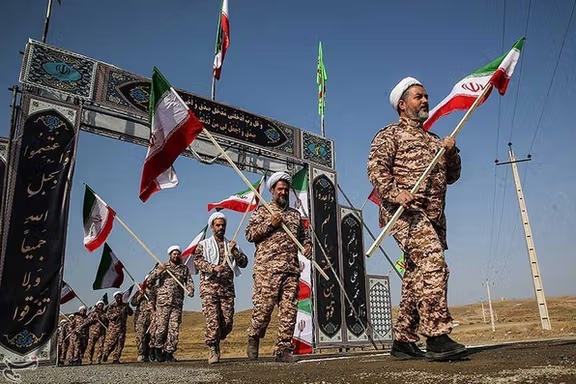
Calls to designate Iran's Islamic Revolutionary Guard Corps (IRGC) arose once again in the British Parliament this week, led by the former defense minister.
Liam Fox hosted a session on the security threats posed by the group at Parliament this week just weeks after Ken McCallum, the Director-General of MI5, referred to "hostile activity by the Islamic Republic in the UK," emphasizing that countering threats from Tehran remains a top priority. "Iran has been a rising source of concern and a rising source of task for MI5 over the last 18 months or so in particular," he said last month.
The British newspaper, The Times, also reported that Iranian regime agents were stirring up unrest in the UK through pro-Gaza protests in the wake of the Iran-backed proxy Hamas' invasion of Israel on October 7.
The session on Tuesday was organized by the International Organization to Preserve Human Rights (IOPHR) and featured lawmakers such as former Leader of the Conservative Party Sir Iain Duncan Smith.
Jason Brodsky, policy director at United Against A Nuclear Iran, and Vahid Beheshti, British-Iranian journalist and anti-regime activist were among the panelists.
For months, Beheshti held a hunger strike for 73 days outside the UK Foreign Office in protest of the atrocities committed by the regime in the wake of the Women, Life, Freedom movement protests. Following the latest calls for designation, he told Iran International he is optimistic after earlier this week, more than 60 lawmakers urged the British Prime Minister to ban the IRGC, designated by the US in 2019.
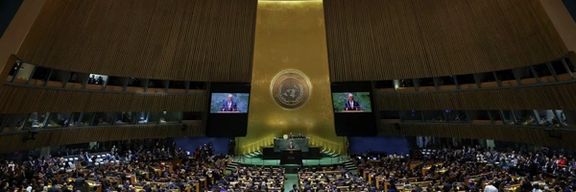
A UN General Assembly committee has slammed Iran for discriminating against and harassing women and girls, in addition to a host of other human rights violations.
The Third Committee of the 78th General Assembly approved a resolution entitled “Situation of human rights in the Islamic Republic of Iran” by a vote of 80 in favor to 29 against.
Another 65 countries, including many with a track record of human rights abuses such as Saudi Arabia, Egypt, and South Africa, abstained. A bevy of dictatorships voted against, including Iranian ally Russia, Belarus, Syria and North Korea.
The resolution, whose draft was introduced by Canada, condemned the misogynistic policies and practices of the Iranian regime, calling on Tehran to put an end to its discrimination against women.
The regime continues to introduce yet stricter legislation to crack down on hijab and ‘chastity’ laws as more women across Iran reject the mandatory headscarf and curbs on their behavior. Surveillance has been stepped up and like Mahsa Amini, the symbol of the Women, Life, Freedom uprising which began after her death in morality police custody last year, a 16-year-old girl, Armita Geravand, also died in their hands in recent weeks.
Citing “the Iranian authorities’ flagrant disregard for human rights, life and dignity”, the resolution condemned “the intensified, targeted repression of women and girls by Iran, both online and offline”. Women are arbitrarily arrested on the street for hijab refusal and refused entry to public spaces including universities, hospitals and public spaces.
Iran’s #MeToo movement has also chronicled systemic sexual abuse in the country’s legal system, women under constant threat of sexual violence on the streets and in prison.
The resolution cited “mass arrests and arbitrary detention, disproportionate use of force, including force leading to the death of peaceful protesters, and imposition and carrying out of the death penalty against those connected to the protests.”.
More than 500 demonstrators were killed by security forces in the protests following Mahsa's death, after they were given free rein by the regime’s top officials in an attempt to quell the uprising.
The resolution also called on Iran to end its harassment and persecution of political opponents and human rights defenders, especially those belonging to minority groups, a phenomenon which has worsened since the uprising.
In October, rights group Amnesty International reported a new wave of crackdowns on Baluchi protesters in Iran.
The people of Sistan-Baluchestan have been holding weekly protests after security forces opened fire at peaceful protesters, killing nearly 100 on September 30, 2022, a day known as the Bloody Friday of Zahedan. Zahedan is one of the few Sunni-majority cities in predominantly Shiite Iran.
“The authorities are ramping up their brutality to stop Baluchi protesters from gathering each week in Zahedan,” warned Diana Eltahawy, Amnesty International’s Deputy Regional Director for the Middle East and North Africa.
The resolution of the General Assembly’s Third Committee, which addresses social, humanitarian and cultural issues, also urged Tehran to cooperate with international human rights mechanisms, especially with the UN special rapporteur on human rights in Iran, Javaid Rehman.
Earlier this month, Rehman warned that the Israel-Hamas war bolsters repression inside Iran by deflecting attention from internal criticism of the regime to regional issues as the conflict instigated by Iran’s biggest Palestinian proxy against Israel, rages on.
In a post on X, Abram Paley, the US State Department's deputy special envoy for Iran, hailed the passing of the resolution. “We stand with the people of Iran as they continue their fight against oppression and violence and for a free and democratic future,” he said.
The resolution comes a week after United Nations reiterated concerns regarding the human rights situation in Iran, urging the release of detained protestors and an immediate end to executions which have also escalated since the uprising began in September last year.
The committee noted “the alarming increase of the use of the death penalty”. According to a UN report, at least 419 people were reportedly executed, including 409 men and 10 women, between January 1, 2023, and July 31, 2023, marking a 30 percent increase compared to the same period last year.
The committee also approved six resolutions including on the human rights situations in Ukraine, Syria, Iran, Myanmar and the Democratic People’s Republic of Korea.
Iran’s representative at the session, Zahra Ershadi, rejected the resolution branding it “biased and politically motivated”. Falling back on regime rhetoric to attack the West, she blamed it on “Canada, the United Kingdom, France, Germany, the United States, and the occupying and apartheid Israeli regime — the classic cast of characters and the usual suspects.”
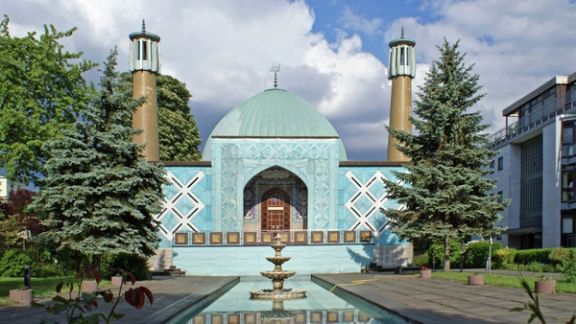
German authorities have executed raids on 54 locations connected to the Islamic Center of Hamburg (IZH), suspected of supporting the militant group Hezbollah.
Iran-backed Hezbollah, its biggest regional proxy based in Lebanon, is designated in several countries including the US and UK, and was designated by Germany in 2020. However, the IZH still has a deep influence on the likes of schools and mosques in Germany, believed to be an extension of the regime.
German Interior Minister Nancy Faeser highlighted that the IZH has been under continuous surveillance by German intelligence services, being categorized as "Islamist."
"We have the Islamist scene in our sights," she said following the Thursday raids. "Especially now, at a time when many Jews feel particularly threatened, it's important to state: we do not tolerate Islamist propaganda or anti-Semitic and anti-Israel agitation."
Cities across the world have seen a massive rise of antisemitism since the war began on October 7 when Iran-backed Hamas militia invaded Israel, killing at least 1,200 mostly civilians and taking around 240 more hostage. Israel's response has been the most deadly since Hamas took control of the strip in 2007.
Since the war broke out, a firebomb attack was carried out on a synagogue in Berlin and German police arrested a convicted Islamist on suspicion of planning an attack on a pro-Israel event.
According to DW, SPD politician Andy Grote, the interior senator for the city-state of Hamburg, called the raids a "hard blow" against the IZH whose time, he said, "has run out." "The sooner the IZH disappears from Hamburg entirely, the better," he said. "Today, we've come a great deal closer to that."
"I'm pleased that the federal interior ministry is pushing strongly for a ban. I am confident that this process will be concluded thoroughly and that the IZH will soon be closed," Grote said.